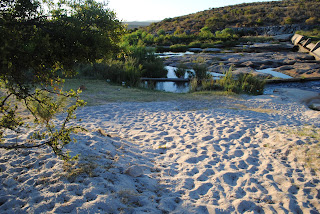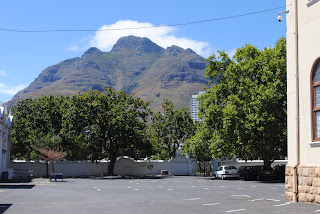Last week was phenomenally busy. And not in a good way. We had a final for John’s course on Thursday from 9-12, then got straight on busses to go on a 3 day, 2 night field trip to a very small town called Clanwilliam, famed for its numerous rock art sites. I felt like my brain had been taken over by other peoples’ thoughts. Unfortunately, as Jackie can attest, I was in quite a mood – I even improvised an “I hate Clanwilliam” song before loading the busses.
The bus ride was more than 3 hours, so I had a lot of time to cool off (but only figuratively – Clanwilliam is, as Jean says, “an extreme of the earth” – 40+ degrees Celsius while we were there). When we arrived in Clanwilliam, we were shown to our “dormitory style” sleeping quarters, a room with 15 bunk beds for the girls, and an equal sized room next door for the 9 boys. The feminine energy was roaring. We then got a short introduction to the Living Landscape Project, the environmental organization that was hosting us for the weekend.
(C)lan(w)illiam
On our drive to the first rock art site!
The sun setting at the first rock art site.
That evening we drove to our first rock art site, which is owned by the University of Cape Town. Our Living Landscape guides, Ciaca and David, told us about the history of San rock art and its particular contemporary significance; similar to !Khwa ttu, awareness of San rock art is giving San culture a voice that was, for some time, lost within the grips of colonialism and total exploitation. The site was absolutely gorgeous. We took what David Bunn calls “the most romantic swim of our lives” under the sunset, then walked a short distance to see rock art that was thousands of years old, lit only by stars and torches.
Ciaca, on the left, giving us an introduction to San rock art.
"The most romantic swim of our lives."
The rock art site.
On our way to the site, we passed “squatters” as they’re called; people living on the outskirts (sometimes referred to as “the bush") of Clanwilliam proper, on only what they are able to collect from their surroundings. Knowing that UCT owns this land, I asked Jean about the legalities surrounding the squatters. She said that while technically it is private property, UCT allows them to stay because they really have nowhere else to go but further into the bush – where conditions are even harsher, and work is even harder to come by. If any of you have ever seen the Israeli film 9 Star Hotel (a documentary of Palestinian laborers who daringly cross the border every day to find illegal construction work), their small settlements looked almost identical.
Clanwilliam is a town filled with contradictions. The town is literally still segregated – blacks and coloreds (colored is the term for people who are not black and not white, which includes Indians…I haven’t quite gotten used to using it yet) on one side of the road, whites on the other. While legally the schools of course cannot still be segregated, the formerly white Afrikaaner school became private and charges an obscene tuition in order to keep non-whites out. The racial, linguistic, social, and political divisions are more pronounced than anywhere else I have ever seen in my life.
Friday morning, we got up at 6am and drove to two more rock art sites that were about an hour away. The second one was really mindblowing – it was in a giant cave, about a 20 minute walk from the main road where we parked.
How cool is that!
Allen standing in the cave. How amazing!
The descent.
Back at Living Landscape, trying desperately to escape the heat.
That afternoon, we were split up into 6 groups of 4 to go visit various institutions in town in order to get a real grasp of the divisions, the contradictions, and perspectives of the people of Clanwilliam. I went to Bosasa, a Youth Development Centre (also called a rehab center) for boys under 18 who are awaiting trial. Bosasa is privately funded, but admission requires a court referral. It houses 64 boys, for periods of days to years, for crimes as serious as rape and murder – but honestly, you would never know it. The boys were calm, respectful, and engaged, and I really think that can be credited to the attitudes of the Bosasa staff. They are, above all, a “place of safety” – one that treats each child as if they were innocent, whether or not the legal system eventually finds them guilty. Pumla, a wonderfully sweet woman who showed us around and answered our questions, kept saying that each boy “was only a child.” One would assume it takes a lot of convincing to see a rapist or a murderer as “just a child,” but at Bosasa it does not. Pumla also said that at some similar institutions, boys’ activities are strictly separated by age – 10-14 year olds and 15-18 year olds, for example – because the older boys tend to bully the younger ones. But not here, she explained: the older boys often took on leadership roles, looking after the younger, or more troubled, ones. Touring Bosasa had a really powerful impact on me, and I’m sorry I couldn’t find an opportunity to take pictures while I was there.
[Based on my experience at Bosasa, I have decided to write a final research paper for Jean’s course on the rise of rehabilitation centers of this sort after the death penalty was made illegal – I believe there is an important connection here, related to the legal and social acknowledgement of a capacity for human reform (one that surged after the fall of apartheid). I hope to visit similar institutions in Cape Town in the next week or so.]
We ended our day at the Clanwilliam dam, a quiet public beach in the rich part of town where many people who water ski have second (or 3rd and 4th) homes.
Clanwilliam dam.
After we returned from Clanwilliam, I took the most intense shower of my life and relaxed for a few hours. Saturday night we went to Long Street for some drinks, and Sunday a group of us went back to Kirstenbosch to see an Afrikaans band called Fokofpolisiekar (yes, that translates to exactly what it sounds like). The music was nice and the venue, of course, incredibly beautiful and relaxing. And Gillian came! She is studying at UCT for the semester. We had a mini-MCS reunion - in South Africa, of all places. How fitting.
This picture is nothing novel, but I thought I'd make you all jealous...again
MCS '03 - throwbaaack!
Yesterday I visited the District 6 museum, which originally started out as a sort of memory project to compile stories about those who were displaced when District 6 was declared a whites-only area in the 1960s. This forced thousands of black and colored people into townships, and their homes were bulldozed en masse to make room for white development. Tours of the museum are given by previously displaced people – our tour guide was named Noor, a 66-year old Muslim Indian-Scottish man whose house was destroyed after 4 generations of his family had lived there. He really emphasized that despite the atrocities of apartheid, he had no ill feelings towards white South Africans. The government oppressed the majority of the population for decades, but he continued to say “I do not hate them, I forgive them.” That sentiment is prevalent in South Africa, and I asked if he thought that Nelson Mandela (who very much shares this view) was instrumental in influencing this attitude. He said he certainly thought so. Yet he did also add, “I really do not like any kind of government,” which I thought was very interesting.
Noor, our tour guide, telling us about being displaced and his life under apartheid.
Just finished my first week of Jean’s course. She is much more approachable than I expected, and lectures in a completely different (but equally brilliant) way from John. She is also absolutely hysterical. I am very lucky to be here.
Miss you all!





















































